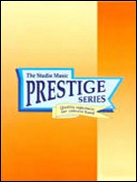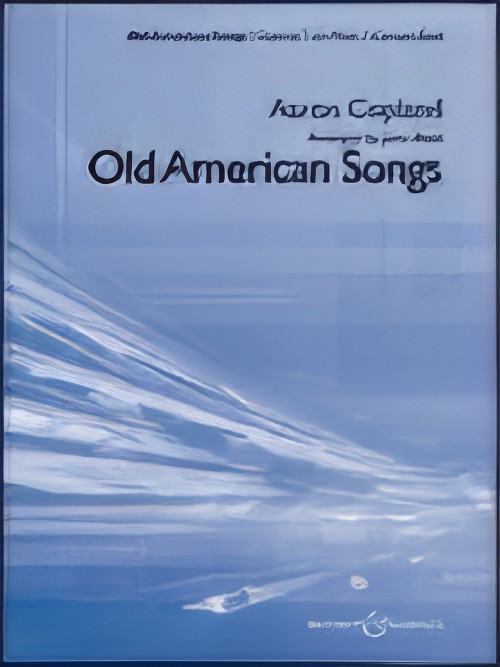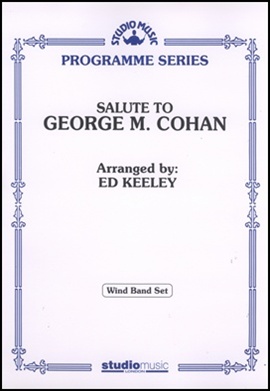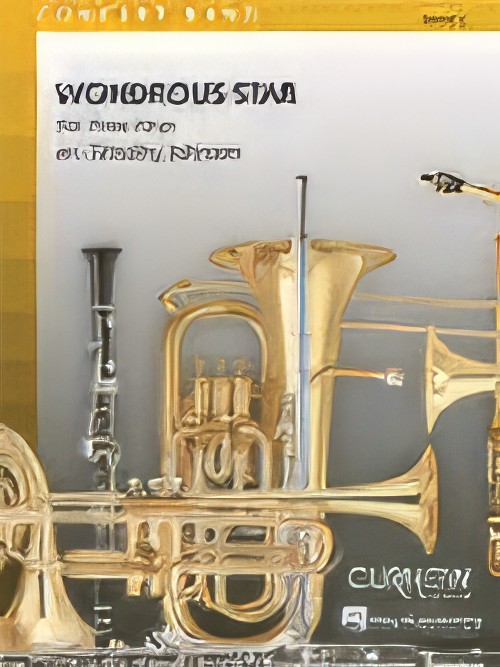Results
-
£154.99
Achnaton Wind Band Set (Score & Parts)
The Egyptian pharaoh Amenhotep IV, better known as Achnaton, was the second son and successor of Amenhotep III. He reigned the New Kingdom from 1353 until 1336 BC. Achnatons lack of interest in the economic well-being of Egypt ushered in a revolutionary period in Egyptian history. His harsh reign induced much suffering under the population. During this period when it was customary for a pharaoh to have many wives, he had taken his cousin Nefertete to reign as queen at his side. An elegant and very beautiful woman, she used her influence to ease the turmoil caused by Achnaton. Combined with her grace, her presence at public functions led to a greater popularity among her subjects than the pharaoh enjoyed himself. Being mostly preoccupied with religious questions, he declared that all the other gods did not exist. There was only one god, the Aten, and it was the sun itself. It was now necessary to change his name: 'Amenhotep' meaning 'the god Amun is satisfied', because he didnt want to be associated with Amun or any of the other deities. He renamed himself 'Achnaton' which means 'servant of the Aten' -- a much more appropriate title! In the sixth year of his reign Achnaton also moved the capital to a brand new city called Achet-Aton ('the Horizon of the Aten') which was where Tel el-Amarna stands today. He did this to further isolate himself from the 'old' religion, since the previous capital Thebes was the centre of worship of Amun. This new religion created an up rise among the population and high priests. In spite of Nefertetes influence, the falling economy and religious conflict resulted in the decline of the Egyptian empire. Hoping to forget it ever happened, people later tried to eradicate all traces of Achnaton and his successors rule by smashing their statues, mutilating their mummies, and ruining their relief carvings. From that moment on he was remembered as the 'heretic king'. This composition was partially funded by the 'Prins Bernhard Cultuurfonds'. 09:00
Estimated dispatch 7-14 working days
-
£244.99
Brabantia Aeterna Wind Band Set (Score & Parts)
In 2006 Brabant will be celebrating it's 900th anniversary. On May 13th 1106 the count Van Leuven was appointed duke of Brabant. This was the birth of the duchy of Brabant. For centuries this duchy, situated in the heart of the Netherlands, was the primary of the seventeen provinces in the Lowlands. Brabant formed with it's capital cities Brussels, Leuven, Antwerp and 's-Hertogenbosch the focal point for politics, culture and economy. The revolution against Spain (1566-1648) caused a fracture between the North and South. The old duchy was divided into a Dutch and Belgian part. Even though each had their own historical background, the bond forged in the past was partially kept alive. To this day we still have a duke of Brabant. Brabantia Aeterna takes you on a musical journey through 900 years of Brabant history. A fascinating journey portraying war and peace, love and grief, prosperity and adversity, development and deterioration. Listen to how monks chanted, bells tolled and churches were built. Or take the thirteenth and fourteenth centuries with their bustling markets, builders of cities or the bleating of countless sheep across the heather. The plague, tribulations, soldiers and political bickering in the following centuries. Hear how the industrialisation of the nineteenth and twentieth centuries provided prosperity for the region and how to this day the following saying still applies: 'the road to Brabant leads to a warmer world' Brabantia Aeterna was commissioned by the Brabantse Bond van Muziekverenigingen (Brabant Music Society) in honour of its fifth anniversary. 17:00
Estimated dispatch 7-14 working days
-
 £21.95
£21.95BRIGHT SUNLIT MORNING (Ralph Hultgren) (Baritone Vocal/Prestige Concert Band Extra Score) - Hultgren, Ralph
Extra Score. Described, by the composer, as "a personal reflection on the events in the USA on the morning of September 11th 2001". Inspiration came from quotations in the bible. Bright Sunlit Morning features the words of many Psalms and other sections of the Old Testament and are sensitively incorporated in this work for baritone vocal and concert band. Performance time 12'13' (Recorded on QPRM 149D BRIGHT SUNLIT MORNING, Regimental Band of the Coldstream Guards).
Estimated dispatch 7-14 working days
-
 £107.95
£107.95BRIGHT SUNLIT MORNING (Ralph Hultgren) (Baritone Vocal/Prestige Concert Band) - Hultgren, Ralph
Described, by the composer, as "a personal reflection on the events in the USA on the morning of September 11th 2001". Inspiration came from quotations in the bible. Bright Sunlit Morning features the words of many Psalms and other sections of the Old Testament and are sensitively incorporated in this work for baritone vocal and concert band. Performance time 12'13' (Recorded on QPRM 149D BRIGHT SUNLIT MORNING, Regimental Band of the Coldstream Guards).
Estimated dispatch 7-14 working days
-
 £39.60
£39.60Christmas Surprise (Concert Band - Score and Parts)
Christmas Surprise is a perfect composition for your first Christmas Concert. It only uses the first 7 notes introduced in most beginning band methods; concert Bb to G plus the low A. This arrangement uniquely combines Jingle Bells and Jolly Old Saint Nicholas with Haydn's Surprise Symphony. It also includes a unique section where the band sings.
Estimated dispatch 7-14 working days
-
£84.99
Durkle Bandrydge Suite Wind Band Set (Score & Parts) - Fraser, Bruce
Durkle Bandrydge is the name of the composers imaginary world, but it could very well be anyones invisible dream world with a different name. In this very versatile suite by Bruce Fraser, 8 characters are featured, each with its own peculiarities, making Durkle Bandrydge such a colourful place. Do these characters differ that much from us? That is for you to find out! In the last part, all characters come together in a special way.Durkle Bandrydge exists at the end of your street. It is invisible to humans, but Durkle Bandrygators can watch us with great interest. The music will introduce you to some of the characters who live in this unusual place. The parts: Somnanbulyss, who is a giant troll guarding the entrance to Durkle Bandryde. At least, he is supposed to, but he tends to sleep most of the time. His music is therefore very slow moving and sleepy. Long Gwysteen is a tall, mysterious, and somehow sophisticated character, who walls around with a shell on his back. His music glides along rather gracefully. Squelfitch is a rather unpleasant and smelly character who lives in a bog, which is why his music sounds rather slimy and a bit like trying to walk through quicksand. Perfydlia is a meddling old woman, who gossips about everybody and squeals with sudden delight at the small exciting bits of tittletattle about others in the village. In the music you can hear her sudden little squeals of delight. Maryann Lovely is a beautiful young lady, graceful, gorgeous, absolutely devine, and her music is obviously just the same. Thistledoo Nicely is a lively character who spends and spends and spends with her credit card, buying the latest fashion and never worries about having to pay the bills. Her music reflects her excitement when shopping and het 'happy go lucky' approach to life. Marsyn Edginton is the Lord of the manor, the richest man in town, the 'big cheese', the man with all the power and, of course, the biggest house. He is very grand and his music like he could be a king. Jimmy McScotsmyn is a red haired scotsman wearing tartan cap. He misses his home country terribly and eats lots of shortbread, oatcakes, scotch eggs, porridge and drinks an enormous amount of Scotch Wisky, which helps him to have fond memories of the kind of music he would like to dance to when he was a younger man. His favourite dance is a Jig and this is the music he remembers. Grand March of the Durkle Bandrydgators. We hope that you have enjoyed meeting these characters from Drukle Bandrydge and would invite you to listen to all the villagers now march along in a grand parade - it is a pity that you can not see them, what is a wonderful sight. If you listen carefully, you will hear the melodies which belong to the characters as they march past. Oh what a grand spectacle! 10:00
Estimated dispatch 7-14 working days
-
 £40.95
£40.95OLD AMERICAN SONGS (Young Band) - Copland, Aaron - Moss, John
From Copland's well-known collection for voice (accompanied by piano or orchestra), John Moss has crafted an exquisite suite of four selected movements for young band. Certain to become a welcome addition to the band repertoire, this arrangement offers a wonderful opportunity to program accessible music by one of our greatest American composers. Includes All the Pretty Little Horses, Ching-a-Ring Chaw, The Golden Willow Tree, and Simple Gifts.
Estimated dispatch 7-14 working days
-
£454.99
Pinocchio (Complete Ed.) Wind Band Set (Score & Parts)
The many adventures of Pinocchio, written by Carlo Collodi, have become a classic in children's literature of the 19th century. Known and loved around the world, this story has been adapted in many different ways. Ferrer Ferran sets the adventures of this lovable, wooden puppet in an exciting, passionate, sweet and fascinating symphonic suite. Pinocchio consists of four contrasting movements: Pinocchio, Mister Gepetto and the Talking Cricket, The Fairy with the Turquoise Hair, The Field of Miracles and The Land of Toys/The Terrible Dog sh/Pinocchio Becomes a Little Boy. This suite will be loved by young and old alike. 26:45
Estimated dispatch 7-14 working days
-
 £69.95
£69.95SALUTE TO GEORGE M. COHAN (Programme Concert Band) - Keeley, Ed
This medley presents four of the biggest Cohan hits: I'm a Yankee Doodle Dandy; Mary's a Grand Old Name; Give My Regards to Broadway; Over There. This last title has had great prominence in the UK recently with a pseudo operatic performance being used for a successful TV insurance advertisement 'Go Compare'. This took the song back to its roots as the first recording of it was by the great Italian tenor, Caruso.
Estimated dispatch 7-14 working days
-
 £57.50
£57.50WONDROUS STAR (Intermediate Concert Band) - Johnson, Timothy
This item may be Print on Demand (approx 3 weeks). Whether a powerful opener or a thrilling centerpiece, this stirring new arrangement of "We Three Kings" maintains relentless momentum. Melodic and orchestrational surprise after surprise unfolds. Timothy Johnson gives this delightful old favorite an entirely new wardrobe in an arrangement that bears great gifts for the musicians and the audience alike.
Estimated dispatch 7-14 working days
